A Political Trojan’s Horse: How Agora’s Hack Allowed Citizens to Directly Shape Legislation
Belgium is a nation of a patchwork of creative institutions, working to avert political conflict between its various communities. This results in complex and inclusive structures for three language communities (French, Dutch and German speakers) and three different regions: Wallonia in the South, Flanders in the North, and in the middle, the very European and cosmopolitan Brussels!

Belgium communities and regions.PHOTO: Credit: ResearchGate
As a point of intersection of those disparate needs, the capital, Brussels, suffers from institutional dispersion. Many different levels of powers and political actors must be involved in decision-making for it to be effective. This could mean more cooperation and inclusiveness in the political realm or more exertion of force. Both occur. Or political stalemate ensues, as illustrated by the recurring failure of political parties to form a federal government in Belgium.
The institutional structure also offers opportunities. In this blog, we’ll show how citizens creatively leveraged institutional shortcomings to create a new space for political expression free from the usual partisan logics.
In response to the political crisis of 2010-2011, where it took 541 days to find a new government, Belgian citizens organised to make their voices heard. The G1000 Citizens’ Summit randomly selected 1,000 citizens to deliberate about the most pressing political questions proposed and prioritized by citizens.
In 2018, the situation wasn’t much brighter. In response, a few Brusseleirs started a movement – Agora.brussels – to hack the Brussels regional parliament with a Trojan horse. The idea: the movement would participate in elections with a citizen electoral list. If one or more seats were won, the financial and human resources provided for parliamentary work would be deviated into organising a new democratic institution: the Brussels Citizens’ Assembly. Agora.brussels eventually won one seat and set out to select Brusseleirs by lot to design and organise a deliberative proposal process.
An institutional loophole – the low number of votes necessary to obtain a seat in the Dutch-speaking part of the parliament – enabled citizen’s voices to be directly represented in parliament. Since the 2019 regional electionsImproving transparency in elections and maintaining the independence of electoral commissions is vital for promoting trust in the electoral system, preventing electoral fraud, and upholding the democr... More, the Agora.brussels member of parliament has the sole mandate to represent the interest of citizens in political decision-making and is the direct spokesperson for the proposals made by citizens collectively in the four assemblies Agora.brussels has organised since.
The intention of organising citizen assemblies and representing them in the parliament was to prove their significance for the region of Brussels. But how can we make our complicated institutions and political decision-making processes understandable to any citizen? How can we create the conditions in which anyone can express their opinion on any regional issue in our city of over a million inhabitants? Agora’s dream was an opportunity to experiment and identify a process that could be the most effective in giving a voice to the diverse Brussels population. Agora.Brussels especially innovated around personal accompaniment to ensure equity, bridge the digital divide, and continue online assemblies during pandemics. We employed techniques that serve different kinds of intelligences – such as collective drawing, mime, proposal refinement in pairs, critical thinking, and storytelling – to enable an inclusive exchange. An embodied deliberation approach proved powerful both for enabling and obliging each participant to take a stance. We adapted the ‘soft shoe shuffle’ methodology, an interactive facilitation approach of deep democracy, into a very useful tool for citizen assemblies.

Collecting ideas during the 4th Brussels Citizens’ Assembly, which focused on climate and energyEnsuring universal access to sustainable, dependable, and affordable energy is critical to every aspect of prosperity. Increasing public oversight and transparency in the energy sector can help to ens... More.PHOTO: Credit: Brussels.agora

Citizens of the 3rd Brussels Citizens’ Assembly discovering the institutional layers of Belgium.PHOTO: Credit: Brussels.agora
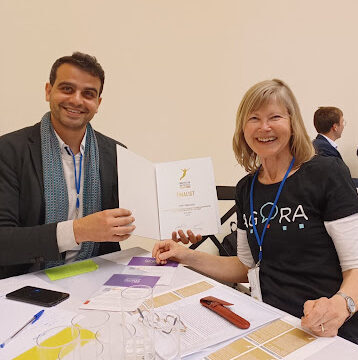
Marie Corman (a volunteer) receiving a certificate on behalf of Agora at the “Innovation in Politics Awards 2023” in Warsaw.PHOTO: Credit: Brussels.agora
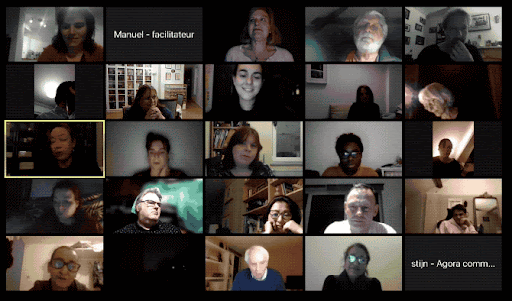
The 2nd Brussels Citizens’ Assembly discussing five proposals during COVID-19 pandemic.PHOTO: Credit: Brussels.agora
To create the panel, we invented a two-step method and an algorithm, to invite people from all the areas of Brussels through random mailing, then calls, emails, social media groups, and even personal visits. In addition to the usual facilitators and panel of experts, we added a few specific features to be more robust and inclusive. This included one notetaker, who could support the facilitator in case of internet issues, and above all, be a neutral ‘resource person’ to fact-check, find answers to citizens’ questions, document assumptions, verify intuitions, back perceptions with numbers, and find the expert or association to invite to the next session. These insights help design political processes that are more accessible to all kinds of citizens.
As a result, Agora.brussels’ citizens’ assembly has allowed 150 citizens over the last four years to get a taste of more active and impactful involvement in political decision-making. More than 200 political actions have been performed, representing dozens of proposals from the four assemblies on major life topics like housing, work and employment, and climate and energy. Agora also organized the first reactive assembly, where citizens chose and evaluated five laws proposed by other parties. But the policy impact of these actions are limited due to the David against Goliath position of the Agora.brussels member of parliament –1 MP of the opposition in a 89-members of parliament. Nevertheless, the institutional impact is considerable as Agora.brussels has contributed crucially to the rise of political will for meaningful citizen participation in Brussels and Belgium in the current legislative period. This is illustrated by the number of new citizen participation institutions such as the deliberative commissions and the Brussels Climate Assembly.

Pepijn Kennis (Agora’s MP) defending Brussels Citizens’ Assembly proposals at the Brussels parliament.PHOTO: Credit: Brussels.agora
We’ve learned that, when organised well, citizens’ assemblies are just as capable as political parties in making relevant proposals. Free from partisan ideologies, proposals or amendments to existing systems are full of nuances. Unlike elected representatives that need identifiable results, assemblies are free of future electoral deadlines. That’s why they have no desire to inaugurate anything. They don’t need media victory. They try to make existing laws effective. Whatever the topic is, they make what already exists simpler, clearer, fairer, more legible, and more understandable. Citizen deliberation – even when creative – is pragmatic. While individuals have larger visions for our society, most compromises focus on everyday issues, like arbitrations between tenants and owners and employees and employers.
For better or worse, the proposals are never extreme. And this has nothing to do with whether the participants’ initial positions are extreme or not. It has everything to do with the fact that citizens who deliberate, listen to each other, integrate the points of view of others, seek and find a form of general interest steeped in nuance.
Unfortunately, because most assemblies in the world are only consultative, these qualities are lost in a political follow-up that remains partial, in both senses of the word.
So, to show their full potential, citizens’ assemblies need to be independent of elections and parties. Belgian political culture has started to try this, but it may take some more time. To keep the idea alive in the meantime, we need movements like Agora and DemocracyNext to hack the elective system. Citizens’ assemblies could become one of the new pillars to our democracies. They can bridge the growing gaps between elected officials and citizens but also between communities, genders, and generations. by taking into account diverse needs. They offer a chance to build a society that is both united and open.
No comments yet
Related Content
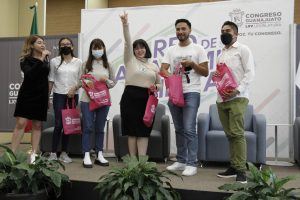 Challenges and Solutions
Challenges and Solutions
Open Parliaments: The Case of the State of Guanajuato, Mexico
Guanajuato is one of the 32 states in Mexico and its State Congress is made up of 36 local congresspeople who represent over 6 million citizens.
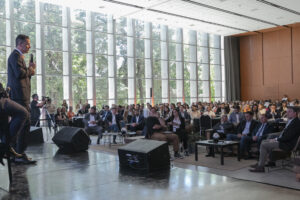 Challenges and Solutions
Challenges and Solutions
Open Parliaments: The Case of the Córdoba Province, Argentina
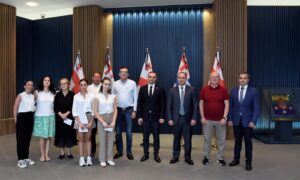 Challenges and Solutions
Challenges and Solutions
Open Parliaments: The Case of the Autonomous Republic of Adjara, Georgia
The Autonomous Republic of Ajara is a political-administrative region of Georgia. Its Supreme Council is made up of 21 congresspeople who represent about 350,000 citizens. While the Autonomous Republic of…


Leave a Reply